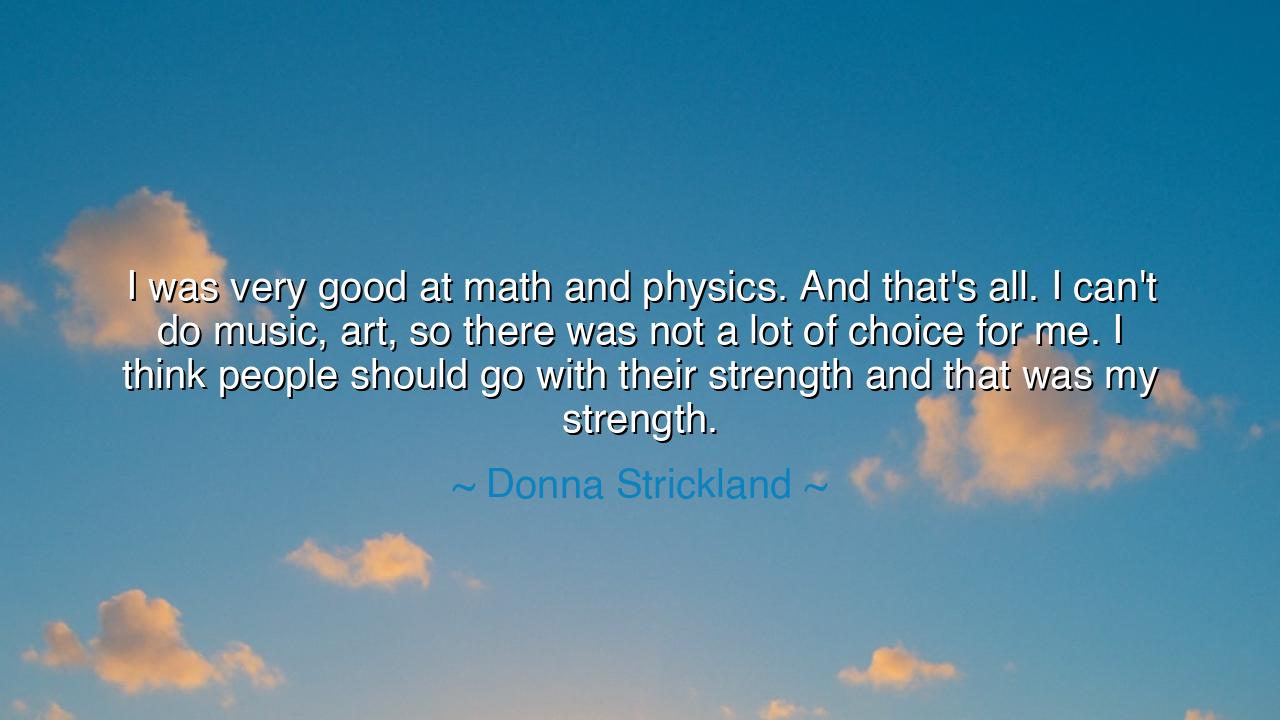
I was very good at math and physics. And that's all. I can't do
I was very good at math and physics. And that's all. I can't do music, art, so there was not a lot of choice for me. I think people should go with their strength and that was my strength.






Hear, O seekers of purpose, the words of Donna Strickland, Nobel laureate of light, who declared with humility and truth: “I was very good at math and physics. And that's all. I can't do music, art, so there was not a lot of choice for me. I think people should go with their strength and that was my strength.” These words are simple in sound, yet profound in meaning. They teach us that destiny is not always found in being good at everything, but in being faithful to the gifts we have been given, however narrow or singular they may seem.
The origin of her words lies in her own path. Strickland, who became one of the few women ever to win the Nobel Prize in Physics, did not begin as one who could excel in all domains. She admits freely that music and art, the paths many revere, were closed to her. Yet she did not despair at what she lacked. Instead, she turned with discipline and devotion to what she did have: a mind sharpened for numbers, an intuition for physical law, and a passion for discovery. Her strength was not in breadth, but in depth—and in that depth she unearthed light itself, splitting the beams of lasers into pulses that changed the world.
This principle echoes throughout history. Consider Isaac Newton, who was not a poet nor a warrior, not a musician nor a statesman. He was, above all, a mind for mathematics and natural philosophy. By leaning wholly into his strength, he uncovered the laws of motion and gravitation, reshaping humanity’s understanding of the cosmos. Had he wasted himself lamenting his lack of gifts in other fields, he might have been forgotten. But by honoring his true capacity, he became eternal.
So too in the story of Helen Keller, who, though blind and deaf, was guided to cultivate the strength of words and advocacy. Her limitations were immense, yet her strengths were profound, and by embracing them, she became a voice for millions. Both Newton and Keller, like Strickland, show that greatness is not born from having all talents, but from honoring the talents you hold.
O listeners, the world often deceives us into believing we must be masters of all things. It praises those who sing, paint, speak, and calculate with equal brilliance. Yet Strickland’s words cut through this illusion: it is not necessary to do everything. What is necessary is to recognize where your strength lies, and to walk boldly upon that road. For it is better to walk firmly upon one true path than to stumble half-heartedly upon many.
The lesson, then, is clear: take honest stock of your gifts, without envy for what others have. If your gift is of the hand, create with it. If of the voice, speak or sing with it. If of the mind, think and discover with it. To deny your own strength is to live in shadow; to embrace it is to walk in light. In doing so, you may find, as Strickland did, that a single gift cultivated faithfully can ripple across the world.
Practical is this counsel: each day, reflect upon the one or two things you do with joy and ease. Do not dismiss them as small; do not abandon them for the sake of fashion. Instead, sharpen them, deepen them, let them become the pillars of your life. For your unique strength is the tool given to you by life itself, and to use it well is to fulfill your purpose.
Thus remember the words of Donna Strickland: “People should go with their strength, and that was my strength.” Take them as both comfort and challenge. Comfort, in knowing you need not be all things to all people. Challenge, in knowing you must cultivate what you have been given with devotion. In this way, your life will not be scattered, but focused; not wasted, but fruitful; not ordinary, but radiant.






AAdministratorAdministrator
Welcome, honored guests. Please leave a comment, we will respond soon